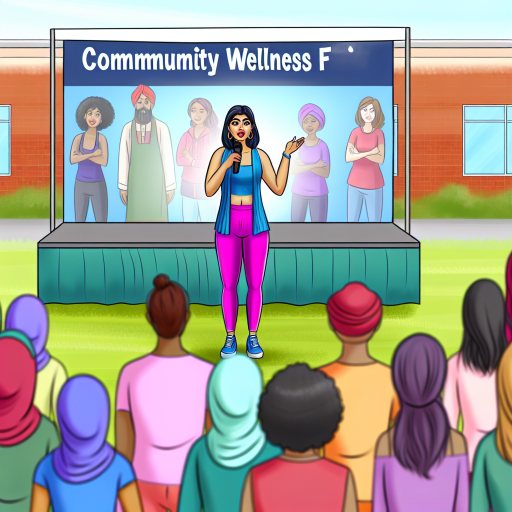Introduction:
Definition of a community health worker: A community health worker is a public health worker who acts as a liaison between the community and healthcare providers.
Importance of community health workers in healthcare systems: They play a crucial role in promoting health education, preventive care, and improving access to healthcare services.
Overview of the essential skills needed for a successful community health worker: To be effective, a community health worker must possess a range of essential skills.
Essential Skills:
- Interpersonal Communication: Build trust, establish rapport, and effectively communicate with diverse populations.
- Cultural Competency: Understand and respect different cultural beliefs, practices, and norms within the community.
- Empathy and Compassion: Show understanding, kindness, and care towards individuals facing health challenges.
- Problem-Solving: Identify issues, create solutions, and navigate resources to address community health needs.
- Active Listening: Listen attentively to community members’ concerns and needs without judgment.
- Advocacy and Outreach: Serve as an advocate for community members and promote health initiatives and resources.
- Organizational Skills: Manage schedules, resources, and documentation efficiently to ensure effective service delivery.
- Teamwork: Collaborate with healthcare providers, community organizations, and other stakeholders to improve health outcomes.
- Adaptability: Be flexible and open-minded to adjust strategies based on community feedback and evolving health needs.
- Self-Care: Practice self-care and maintain personal well-being to prevent burnout and sustain long-term commitment to community health work.
Possessing these essential skills is vital for a community health worker to effectively serve and support the health and well-being of their community.
Education and Training:
Community health workers play a crucial role in promoting health and wellness within their communities.
To be effective in this role, individuals must possess the necessary education and training.
Educational Requirements:
- While specific educational requirements can vary, most community health worker positions require a high school diploma or equivalent.
- Some employers may prefer candidates with an associate’s or bachelor’s degree in a related field, such as public health or social work.
- Having a strong foundation in science, communication, and cultural competence can also be beneficial for aspiring community health workers.
Importance of Continuous Training:
- Continuous training is vital for community health workers to stay current on best practices and emerging trends in public health.
- Professional development opportunities can help workers enhance their skills, expand their knowledge, and improve their ability to serve their communities effectively.
- Training programs focused on topics such as health education, communication strategies, and community outreach can further prepare individuals for success in this role.
Relevant Certifications and Courses:
- Community health workers can benefit from obtaining certifications such as the Certified Community Health Worker (CCHW) credential.
- Other relevant certifications include Basic Life Support (BLS) and Mental Health First Aid training, which can enhance a worker’s ability to respond to health emergencies.
- Additional courses in motivational interviewing, cultural competency, and chronic disease management can also be valuable for community health workers.
Education and training are essential components of a successful career as a community health worker.
By meeting the educational requirements, pursuing continuous training, and obtaining relevant certifications and courses, individuals can enhance their abilities and make a positive impact on the health of their communities.
Communication Skills:
Effective communication is a vital skill for community health workers as it enables them to convey information, listen actively, and build trust with clients.
Strong verbal and written communication skills are important.
Community health workers must be able to clearly articulate information, whether it be explaining health concepts or providing instructions on medication.
It is essential to communicate effectively with diverse populations.
Community health workers often work with individuals from various cultural backgrounds and must adapt their communication style to be culturally sensitive and inclusive.
There are tips for improving communication skills.
Some strategies to enhance communication skills include active listening, using plain language, and being mindful of nonverbal cues.
Community health workers can also benefit from seeking feedback from peers or supervisors to continually improve their communication abilities.
Honing strong communication skills is essential for community health workers to effectively engage with clients, educate communities, and promote positive health outcomes.
Learn More: Collaboration Between Family Support Workers and Other Professionals
Cultural Competence:
Understanding cultural competence is crucial for community health workers.
It refers to the ability to interact effectively with people from different cultures.
Transform Your Career Today
Unlock a personalized career strategy that drives real results. Get tailored advice and a roadmap designed just for you.
Start NowOne of the most important aspects of cultural competence is respecting and valuing cultural differences.
This helps build trust and rapport with individuals from diverse backgrounds.
Here are some strategies for developing cultural competence as a community health worker:
- Education and Training: Take courses or workshops on cultural competency to enhance your knowledge.
- Immersion: Immerse yourself in different cultures by attending community events or volunteering in diverse neighborhoods.
- Active Listening: Listen actively to understand the perspectives and needs of individuals from various cultural backgrounds.
- Language Skills: Learn basic phrases or terminology in different languages spoken by the communities you serve.
- Cultural Humility: Approach interactions with humility, recognizing that you may not know everything about a particular culture.
By actively working on developing cultural competence, community health workers can build stronger relationships with individuals and improve health outcomes within diverse communities.
Learn More: How to Engage Corporate Volunteers
Empathy and Compassion in Community Health Work
Empathy and compassion are essential skills for a successful community health worker.
These qualities allow workers to connect with clients on a deeper level.
They help understand clients’ needs and provide support in a caring and respectful manner.
Significance of Empathy and Compassion in Community Health Work
- Empathy and compassion create a supportive and trusting relationship with clients.
- These qualities help improve communication and understanding of clients’ unique situations.
- Empathy and compassion drive client motivation and engagement in their healthcare journey.
- Workers who demonstrate empathy and compassion enhance the effectiveness of health interventions.
Ways to Effectively Demonstrate Empathy and Compassion Towards Clients
- Active listening is key to show empathy and understanding of clients’ concerns.
- Take the time to put yourself in the client’s shoes to see things from their perspective.
- Show genuine care and concern for the well-being of clients through your actions.
- Offer emotional support and validation of clients’ feelings and experiences.
- Practice kindness, patience, and non-judgmental attitudes when interacting with clients.
Real-Life Examples of How Empathy and Compassion Can Make a Difference
- A community health worker who listens attentively to a client’s struggles with managing diabetes can offer personalized support and resources, leading to improved health outcomes.
- Showing empathy towards a mother experiencing postpartum depression can help her feel understood and supported, encouraging her to seek help and treatment.
- Compassionately assisting an elderly individual with mobility issues to access healthcare services can enhance their quality of life and overall well-being.
- Offering emotional support and comfort to a terminally ill patient can greatly impact their end-of-life experience, providing dignity and peace.
- Empathy and compassion in community health work can create a ripple effect, inspiring positive actions and fostering a sense of community care and support.
Empathy and compassion play a vital role in the success of community health workers.
By demonstrating these qualities, workers can truly make a difference in the lives of their clients.
This fosters trust, understanding, and meaningful connections that lead to improved health outcomes and overall well-being.
Discover More: Essential Skills for Successful Case Management
Problem-solving Skills:
One of the most essential skills for a successful community health worker is strong problem-solving abilities.
These skills are crucial in addressing the diverse challenges faced by clients in the community.
Why are problem-solving skills important in community health work?
- Community health workers often encounter complex issues that require quick and effective solutions.
- Being able to identify and address challenges directly contributes to the well-being of clients.
- Problem-solving skills help community health workers navigate unexpected situations with confidence.
Tips on how to identify and address challenges faced by clients:
- Actively listen to clients to understand their concerns and needs.
- Ask probing questions to uncover the root causes of the challenges they are facing.
- Collaborate with other healthcare professionals to brainstorm solutions.
- Empower clients to participate in decision-making processes that impact their health.
- Continuously evaluate the effectiveness of interventions and make adjustments as needed.
Resources for developing problem-solving skills:
- Take online courses or workshops on problem-solving techniques.
- Practice critical thinking and decision-making exercises regularly.
- Seek mentorship from experienced community health workers or healthcare professionals.
- Read books and journals on problem-solving strategies in the healthcare field.
- Participate in case studies or simulations to enhance problem-solving abilities.
By honing their problem-solving skills, community health workers can better serve their clients and contribute to the overall health and well-being of the community.
It is essential for community health workers to continuously improve and refine their problem-solving abilities to address the evolving needs of the population they serve.
Do you have any other tips on how community health workers can develop strong problem-solving skills? Share them in the comments below!
Gain More Insights: Human Services Assistant: Understanding Client Confidentiality

Organizational Skills:
Being organized and managing time effectively is crucial for a successful community health worker.
Showcase Your Business Today
Reach thousands of readers actively exploring professional services. Publish your business profile and grow your audience now.
Publish Now- Organizational skills play a vital role in case management and client follow-up.
- Effective organization ensures that no tasks are overlooked, and all client needs are met.
- To improve organizational skills, one can utilize tools such as calendars, to-do lists, and task management apps.
- Setting priorities and creating a schedule can help in efficiently managing workload and meeting deadlines.
- Creating a system for storing and accessing client information can streamline communication and improve outcomes.
By honing organizational skills, community health workers can enhance their efficiency and effectiveness in providing care and support to their clients.
Additional Tips for Enhancing Organizational Skills:
- Develop a routine for reviewing tasks and setting objectives for each day.
- Use color-coded systems or labels to categorize and prioritize tasks according to urgency.
- Delegate tasks when necessary to prevent burnout and improve overall productivity.
- Regularly evaluate and reassess your organizational methods to identify areas for improvement.
- Practice active listening and communication to ensure clear understanding of client needs and expectations.
Organizational skills are essential for community health workers to effectively manage their caseload, provide quality care, and build strong relationships with clients and their families.
Teamwork and Collaboration:
Working collaboratively with other healthcare professionals is crucial for community health workers.
Teamwork plays a vital role in providing comprehensive care to clients in the community.
Building strong relationships with colleagues is essential for successful collaboration.
Collaboration is the cornerstone of effective community health work.
By working together with other healthcare professionals, community health workers can create a more holistic and coordinated approach to care.
Collaboration allows for the sharing of resources, knowledge, and skills, ultimately benefiting the clients and the community as a whole.
Benefits of Teamwork in Providing Comprehensive Care to Clients:
- Improved patient outcomes: When healthcare professionals work together as a team, they can provide more coordinated care that leads to better outcomes for clients.
- Enhanced patient satisfaction: Clients are more likely to be satisfied with their care when they see a cohesive team of professionals working together on their behalf.
- Increased efficiency: Collaboration ensures that tasks are divided among team members, leading to more efficient use of time and resources.
Strategies for Building Strong Relationships with Colleagues:
- Effective communication: Open and honest communication is key to building trust and fostering strong relationships with colleagues.
- Respect and appreciation: Show respect for the expertise and skills of your colleagues and appreciate their contributions to the team.
- Conflict resolution: Address conflicts or disagreements in a timely and respectful manner to prevent them from escalating and affecting teamwork.
- Recognize achievements: Acknowledge the hard work and accomplishments of your colleagues to boost morale and foster a positive team dynamic.
Teamwork and collaboration are essential skills for community health workers to effectively provide care to clients in the community.
By working together with other healthcare professionals and building strong relationships with colleagues, community health workers can ensure better outcomes for their clients and contribute to the overall health and well-being of the community.
Essential Skills for Community Health Workers
Successful community health workers require essential skills such as effective communication.
Cultural competence is another crucial skill for these professionals.
Strong problem-solving abilities are also vital in this field.
Continuous learning and development are crucial in this field
Staying updated with the latest health trends is important.
Aspiring community health workers should prioritize skill-building.
They must focus on professional growth to make a positive impact.
Advancing in their careers is essential for community health workers.
Additional Resources
Social Work, Human Services & Counseling
Social Determinants of Health – Healthy People 2030 | odphp.health …
[E-Books for Sale]
The Big Book of 500 High-Paying Jobs in America: Unlock Your Earning Potential
$19.99 • 500 High-Paying Jobs • 330 pages
Explore 500 high-paying jobs in America and learn how to boost your career, earn more, and achieve success!
See All 500 High-Paying Jobs of this E-Book
1001 Professions Without a Degree: High-Paying American Jobs You Can Start Now
$19.99 • 1001 Professions Without a Degree • 174 pages
Discover 1001 high-paying jobs without a degree! Unlock career tips, skills, and success strategies for just $19.99!




